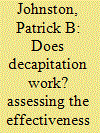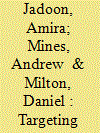| Srl | Item |
| 1 |
ID:
112468


|
|
|
|
|
| Publication |
2012.
|
| Summary/Abstract |
Is killing or capturing insurgent leaders an effective tactic? Previous research on interstate war and counterterrorism has suggested that targeting enemy leaders does not work. Most studies of the efficacy of leadership decapitation, however, have relied on unsystematic evidence and poor research design. An analysis based on fresh evidence and a new research design indicates the opposite relationship and yields four key findings. First, campaigns are more likely to end quickly when counterinsurgents successfully target enemy leaders. Second, counterinsurgents who capture or kill insurgent leaders are significantly more likely to defeat insurgencies than those who fail to capture or kill such leaders. Third, the intensity of a conflict is likelier to decrease following the successful removal of an enemy leader than it is after a failed attempt. Fourth, insurgent attacks are more likely to decrease after successful leadership decapitations than after failed attempts. Additional analysis suggests that these findings are attributable to successful leadership decapitation, and that the relationship between decapitation and campaign success holds across different types of insurgencies.
|
|
|
|
|
|
|
|
|
|
|
|
|
|
|
|
| 2 |
ID:
156905


|
|
|
|
|
| Summary/Abstract |
Targeted killings have become a central component of counterterrorism strategy. In response to the unprecedented prevalence of this strategy around the world, numerous empirical studies have recently examined whether “decapitating” militant groups with targeted killings is strategically effective. This study builds on that research program by examining the impact of targeted killings on militant group tactical decision-making. Our empirical strategy exploits variation in the attack patterns of militant groups conditional on whether a government’s targeted killing attempt succeeded against them operationally. In both the Afghanistan-Pakistan and Israel-West Bank-Gaza Strip theaters, targeted killings significantly alter the nature of militant group violence. When their leaderships are degraded with a successful strike, militant groups become far less discriminate in their target selection by redirecting their violence from military to civilian targets. We then analyze several potential causal mechanisms to account for these results and find strongest evidence that targeted killings tend to promote indiscriminate organizational violence by empowering lower level members with weaker civilian restraint.
|
|
|
|
|
|
|
|
|
|
|
|
|
|
|
|
| 3 |
ID:
190762


|
|
|
|
|
| Summary/Abstract |
Research on the efficacy of leadership decapitation has focused primarily on targeting the topmost leaders of groups. Yet, most organizations rely on multiple leaders with specific functional or geographical responsibilities, rather than a single symbolic leader. In this context, we pose the following question: how are the effects of leadership decapitation on a group’s short-term operational capacity conditioned by the type or rank of targeted leaders? We argue that due to the risks faced by militant organizations, upper-tier leaders will delegate operational duties to lower-tier leadership for security purposes. Because of the shift of the principal-agent dynamic to lower-tier leaders, targeting of lower ranked leaders versus topmost leaders is more likely to result in a loss of control over foot soldiers, and trigger negative effects such as a rise in indiscriminate violence. We conduct our study using the case of Islamic State Khorasan in Afghanistan, with weekly data on the group’s attacks, and multi-tier leadership losses between 2015–2019 across 72 districts.
|
|
|
|
|
|
|
|
|
|
|
|
|
|
|
|